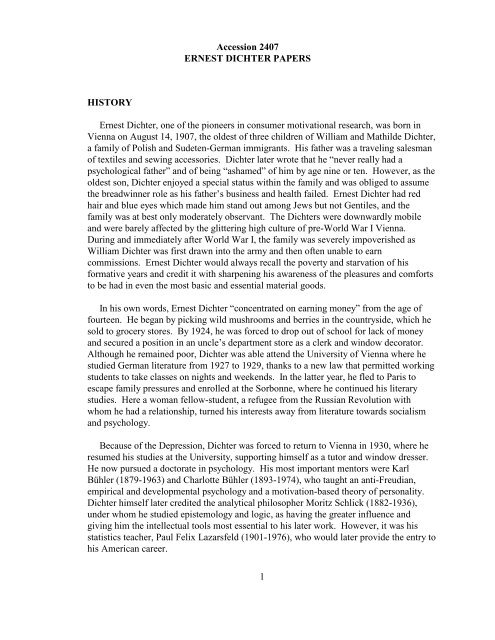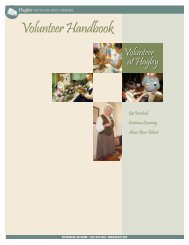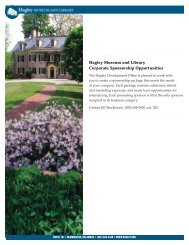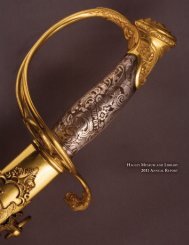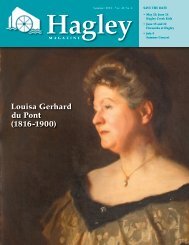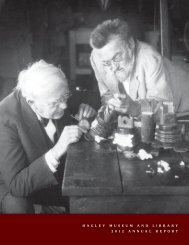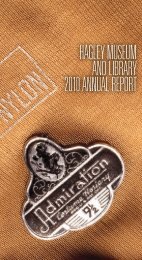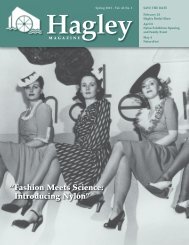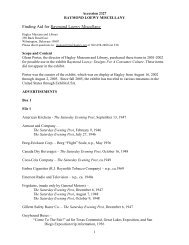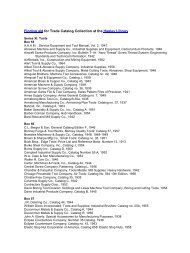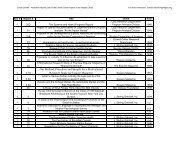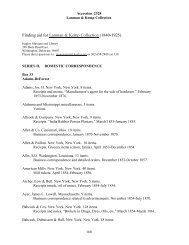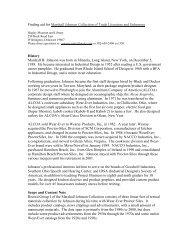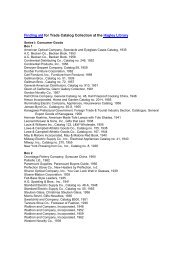Ernest Dichter Papers - Hagley Museum and Library
Ernest Dichter Papers - Hagley Museum and Library
Ernest Dichter Papers - Hagley Museum and Library
Create successful ePaper yourself
Turn your PDF publications into a flip-book with our unique Google optimized e-Paper software.
HISTORY<br />
Accession 2407<br />
ERNEST DICHTER PAPERS<br />
<strong>Ernest</strong> <strong>Dichter</strong>, one of the pioneers in consumer motivational research, was born in<br />
Vienna on August 14, 1907, the oldest of three children of William <strong>and</strong> Mathilde <strong>Dichter</strong>,<br />
a family of Polish <strong>and</strong> Sudeten-German immigrants. His father was a traveling salesman<br />
of textiles <strong>and</strong> sewing accessories. <strong>Dichter</strong> later wrote that he “never really had a<br />
psychological father” <strong>and</strong> of being “ashamed” of him by age nine or ten. However, as the<br />
oldest son, <strong>Dichter</strong> enjoyed a special status within the family <strong>and</strong> was obliged to assume<br />
the breadwinner role as his father’s business <strong>and</strong> health failed. <strong>Ernest</strong> <strong>Dichter</strong> had red<br />
hair <strong>and</strong> blue eyes which made him st<strong>and</strong> out among Jews but not Gentiles, <strong>and</strong> the<br />
family was at best only moderately observant. The <strong>Dichter</strong>s were downwardly mobile<br />
<strong>and</strong> were barely affected by the glittering high culture of pre-World War I Vienna.<br />
During <strong>and</strong> immediately after World War I, the family was severely impoverished as<br />
William <strong>Dichter</strong> was first drawn into the army <strong>and</strong> then often unable to earn<br />
commissions. <strong>Ernest</strong> <strong>Dichter</strong> would always recall the poverty <strong>and</strong> starvation of his<br />
formative years <strong>and</strong> credit it with sharpening his awareness of the pleasures <strong>and</strong> comforts<br />
to be had in even the most basic <strong>and</strong> essential material goods.<br />
In his own words, <strong>Ernest</strong> <strong>Dichter</strong> “concentrated on earning money” from the age of<br />
fourteen. He began by picking wild mushrooms <strong>and</strong> berries in the countryside, which he<br />
sold to grocery stores. By 1924, he was forced to drop out of school for lack of money<br />
<strong>and</strong> secured a position in an uncle’s department store as a clerk <strong>and</strong> window decorator.<br />
Although he remained poor, <strong>Dichter</strong> was able attend the University of Vienna where he<br />
studied German literature from 1927 to 1929, thanks to a new law that permitted working<br />
students to take classes on nights <strong>and</strong> weekends. In the latter year, he fled to Paris to<br />
escape family pressures <strong>and</strong> enrolled at the Sorbonne, where he continued his literary<br />
studies. Here a woman fellow-student, a refugee from the Russian Revolution with<br />
whom he had a relationship, turned his interests away from literature towards socialism<br />
<strong>and</strong> psychology.<br />
Because of the Depression, <strong>Dichter</strong> was forced to return to Vienna in 1930, where he<br />
resumed his studies at the University, supporting himself as a tutor <strong>and</strong> window dresser.<br />
He now pursued a doctorate in psychology. His most important mentors were Karl<br />
Bühler (1879-1963) <strong>and</strong> Charlotte Bühler (1893-1974), who taught an anti-Freudian,<br />
empirical <strong>and</strong> developmental psychology <strong>and</strong> a motivation-based theory of personality.<br />
<strong>Dichter</strong> himself later credited the analytical philosopher Moritz Schlick (1882-1936),<br />
under whom he studied epistemology <strong>and</strong> logic, as having the greater influence <strong>and</strong><br />
giving him the intellectual tools most essential to his later work. However, it was his<br />
statistics teacher, Paul Felix Lazarsfeld (1901-1976), who would later provide the entry to<br />
his American career.<br />
1


